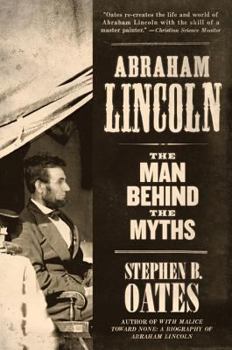Abraham Lincoln: The Man Behind the Myths
Select Format
Select Condition 
Book Overview
"There is no better introduction to current thinking about Lincoln and his place in history." --Newsday "Oates re-creates the life and world of Abraham Lincoln with the skill of a master painter. He succeeds in portraying both the facts and myths of history as essential to our understanding it." --Christian Science Monitor An essential book for any student of Lincoln and American history, Abraham...
Format:Paperback
Language:English
ISBN:0060924721
ISBN13:9780060924720
Release Date:March 2011
Publisher:Harper Perennial
Length:240 Pages
Weight:0.90 lbs.
Dimensions:0.6" x 5.3" x 8.0"
Customer Reviews
3 ratings
The real man behind the myth.
Published by Thriftbooks.com User , 15 years ago
Abraham Lincoln was a great man but between the time of his murder and now, people have made him a myth. However, Lincoln was a man and human, and he was not perfect. Many people judge him by his mistakes, and more revere the myth, but Lincoln grew as a man and leader. His views evolved for the betterment of both himself and his country. Judgement based on his myth or his faults are not valid. Oates' book shows Lincoln in his true human form with all his warts and abilities. My admiration of Lincoln grew with the image of him passing his weaknesses and errors and becoming a strong leader. This is a nice read about a true American hero. The author's book shows Lincoln in all his human ability. During the year celebrating the 200th birthday of Abraham Lincoln, this is a great book to read and understand the true Lincoln.
A Man Greater than the Myths
Published by Thriftbooks.com User , 18 years ago
In this small but valuable volume, Oates explores the reality beyond the two sources of Lincoln myth: the primary myth of a saintly and folkloric Lincoln of Carl Sandburg and a secondary myth of the 'white honky' Lincoln of the 1970's revisionists. Oates emphasizes that Lincoln drew deeply upon the "spirit of his age", which was a profoundly revolutionary time across the world. Oates relates how Lincoln absorbed one of the core lessons of America from the example of Henry Clay: : "in this country one can scarcely be so poor, but that, if he will, he can acquire sufficient education to get through the world respectably". That slavery was the cause of the Civil War is beyond all doubt. As Oates explains, however, the North did not go to war to free the slaves. In the standard phrasing, the North went to war to 'preserve the union'. Oates explores Lincoln's fears that the spread of slavery in the wake of the Kansas-Nebraska Act and the Dred Scott decision would lead to the destruction of democratic society. The debate then still raged on the world stage whether a republican form of government could last. Lincoln rejected the "ingenious sophism" that states could freely leave the Union. "With rebellion thus sugar coated [southern leaders] have been drugging the public mind of their section for more than thirty years." Secession posed nothing less than a final challenge to popular government. If a minority could destroy the government any time it felt aggrieved, then no government could endure. Thus the war had to be fought to preserve not just the American Republic, but the possibility of republican government. Lincoln did in fact oppose slavery from early on. His views on racial matters apart from slavery became more fully progressive over time. Lincoln, however, hoped that slavery would slowly melt away in a losing competition with free labor and that liberated slaves would resettle in Africa. It is part of Lincoln's greatness that he later gave up these views. Oates explores this evolution in his thinking. Oates debunks the notion that the Emancipation Proclamation was unimportant in liberating the slaves. Oates also refutes the notion that Lincoln would have favored an easy hand during Reconstruction. On the contrary, the evidence strongly suggests he would have led the so-called Radical Republicans. Highly recommended for any reader with an interest in Lincoln, the Civil War era, or really pretty much any American.
Separating mythos from the mortal
Published by Thriftbooks.com User , 26 years ago
We invented Abraham Lincoln. Not the man, of course, but the myth, that solemn and statuesque giant memorialized eternally overlooking the Capitol mall. The power of that myth and the quiet dignity of its personage dwarfs us all. But the myth is not the man. Myths never are. Stephen Oates in his _Abraham Lincoln, The Man Behind the Myths_, does not seek to diminish the man but rather to clarify him, separating the mythos from the mortal. And it is not an undaunting task, it seems, for overly soon after Lincoln's tragic end the mills began to churn. The public's shredding of the White House interior for mementos while Mary Lincoln lay debilitated in the next room seems symbolic of the wolfpack mentality in Washington even today. And every new memoir published by another family acquaintance of the Lincoln's almost always got it wrong, and tore anew at the heart of the family. We may not have memorialized and glorified our modern-day tragic heroes to such an extent, for we have simultaneously tried to scandalize them. But the tabloid trade it seems has always been a yellow paper. Even Lincoln was vilified in his time and after. He was, Oates, reminds us, one of the most unpopular living presidents of our history. But though the legacy ballooned to heroic proportions after his passing, the man seems to have been lost in it all, remaining only in the hearts of the family leaving quietly and unattended down the steps of the White House never to return.






